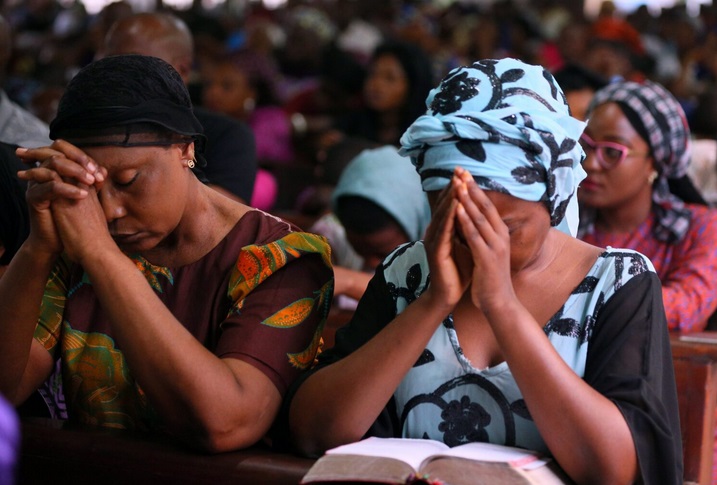Australian Catholic University training Nigerian lay ministers
The Australian Catholic University's Center for Liturgy offered a training programme for lay liturgical ministers of the Word in Nigeria.
Mar 10, 2024

By Ngala Killian Chimton
The Australian Catholic University's Center for Liturgy offered a training programme for lay liturgical ministers of the Word in Nigeria. The programme, delivered online, aims to equip participants with spiritual and technical skills needed to effectively proclaim the Word and serve in their ministry.
The four-week programme, conducted throughout February, covered topics such as liturgy, the Bible, the Church’s liturgical year, and the documents and guidelines of the universal Church. The programme also addressed the specific needs and challenges of the Church in Nigeria, such as the translation of the Bible, pastoral practice and cultural diversity.
Cathy Murrowood, liturgy educator at the ACU Centre for Liturgy, said that the programme was designed in consultation with the parish leaders in Nigeria, who expressed interest in a comprehensive and relevant training programme from a dedicated liturgical centre.
“The Church in Nigeria places great importance on worship so they train their ministers well. They were looking for a comprehensive programme from a dedicated liturgical centre with liturgy specialists. We are honoured to be able to offer this program to them and to support them in their ministry,” Murrowood said.
She said the programme was adapted to meet the specific needs of Nigerian lay ministers. Sixty Catholics participated in the training.
“We made changes to the translation of the Bible in the programme so that technical exercises corresponded to the Lectionary used in Nigeria. We were able to discuss aspects of pastoral practice in the Nigerian church and make some adjustments to the programme,” she said.
Uju Nwoga, a member of the Divine Mercy Catholic Church in Lekki, located in Nigeria’s Lagos state, who solicited the training, said that it provides an opportunity “to reinforce and validate what we are already doing in our ministry, helps us to appreciate cultural differences with respect to our ministry and provides the platform to make inquiries on matters pertaining to our faith from experts in the ACU Centre for Liturgy.”
For Murrowood the need for ministers is to go beyond just reading the Word of God. They have to proclaim it if their ministry aims to be successful.
“The term ‘proclaimer’ is commonly used by the Church to describe those who undertake ministry of the Word in the Church’s liturgy,” she said.
“Proclaimers are people of faith who understand that God speaks to his people through sacred scripture. ‘Proclaim’ comes from Latin, pro and clamare, meaning ‘cry out’ or ‘shout forth.’ Proclaiming, then, is much more than simply reading words on a page," Murrowood emphasised.
“A dynamic proclamation evokes a prayerful response in believers,” she explained.
Part of the training, she said, involves an exploration of the significance of proclamation so that all can become more effective ministers.
The programme is delivered through a combination of online resources, videos, quizzes and live Zoom classes, where participants can interact with the facilitators and other ministers.
The facilitators are experts in liturgy and ministry from the ACU Centre for Liturgy and other partner institutions.
The programme is the result of collaboration between the centre and the Archdiocese of Lagos, which expressed interest in providing quality training for its ministers of the Word. The archdiocese has over 200 parishes and more than 1,000 ministers of the Word, who serve in various liturgical celebrations.
Nigeria is one of the countries in the world with the best Mass attendance. As many as 94 per cent of self-identified Nigerian Catholics surveyed said they attend weekly or daily Mass, according to a study published in early 2023 by Georgetown University’s Centre for Applied Research in the Apostolate. It also is one of the most persecuted, according to reports.
“We are both excited and delighted to connect with our fellow Catholics in Nigeria,” said Clare Johnson, director of the Centre for Liturgy.
“The Catholic Church constantly needs to train enthusiastic members of the faithful, both new and more experienced, to undertake liturgical ministries. When well-trained Catholics perform liturgical ministries with knowledge, belief and confidence, liturgical celebrations are enhanced, and our faith is strengthened,” she said.
Murrowood hopes that the programme is the beginning of a long partnership with the Church in Lagos and the centre’s staff “look forward to providing more training, if requested,” she said.
“It is an exciting and dynamic church. We believe that this programme would be suitable for any Catholic community and so requests from other parishes and dioceses from other countries are welcome,” she said.
Nwoga said the training helped the group gain a better understanding of worship in the Mass, so that they can now proclaim the Word of God from a place of relationship … rather than simply reading — and igniting in us a love for God and the community we serve.
“We are hoping to become more effective proclaimers and ministers of the Word, becoming more transformed into the image of Jesus and walking in his footsteps more closely,” she said.
The ACU Centre for Liturgy’s online training programme is now in its third year. Murrowood said both rural and city parishes and schools in Australia and in and around the Pacific region have benefited from the programme, but training ministers from Nigeria is a first in Africa.
“There has been great interest in the programme, and feedback has been consistently positive,” Murrowood said.
Johnson added that they “truly welcome the opportunity to engage with our African brothers and sisters in this special educational programme.” --OSV News







Total Comments:0